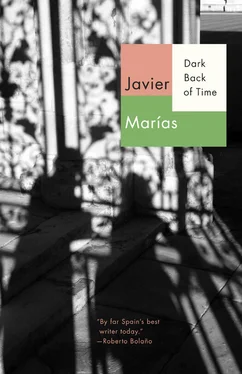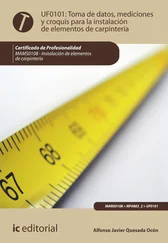So with respect to the scant degree of autobiography in my book, the only thing that was demonstrable in the negative was that I did not then and do not now have a wife named Luisa, nor, in fact, a wife by any name, and still less a child who was then a newborn, and who, if he had existed and was not in vain, would now — horrors — be seven or eight years old, a little thug or who knows, worse still, maybe a little know-it-all who ought to be run out of the country. (I might not have been a good father.) But even that was attributed to me by people who knew little about me and nothing about my private life.
At the time, I was teaching courses on translation theory at the Universidad Complutense in Madrid, an accidental thing that lasted four years — I never thought seriously of dedicating myself to the long-suffering profession of teaching, plagued with subterfuge and intrigue — following several vagabond years not only in Oxford but also near Boston and in Venice. I was not fond of the Spanish university milieu and its many pettinesses so I took advantage of the evening classes in order to avoid all faculty life and appear only when absolutely necessary at the gloomy university, half-empty, its lights dimmed, already taken over by the cleaning ladies who at those hours feel themselves to be in charge of the day’s residue and shoo away or give orders to the professors and students, as they gave orders to the passengers and railway workers in the station of Didcot, or in that other station in Mestre, near Venice, where I spent part of one night cast out and wrapped in mist. I gave my classes, which were improvised in the taxi on the way there, and left as soon as they were over, at nine or ten p.m., depending on the day, so there was hardly any scope for fraternization with the students or networking with my colleagues, and almost no one knew anything about me that wasn’t more or less public information. And there, not long after Todas las almas came out, I had my first warning — or perhaps it was the second — of how everything my narrator spoke of and said, from start to finish, might be ascribed to me. A group of students — most of them women — was waiting for me one night outside the classroom to consult me on various matters, to which I imagine I must have improvised some response, and as I walked through the hallways with my inappropriate briefcase made of hard black plastic with a blue handle, surrounded like some idiotic politician among his handlers and journalists (I’ve noticed that professors, real, daytime professors, very much enjoy having their students flock around them as they walk, and it amused me to imitate them for once), one young woman, out of the blue, asked me solicitously, “How’s the baby?”
“What baby?” I said, surprised.
The student was very sure of herself. “What other baby would it be? Yours.” I think she employed the polite form of address— el suyo —but she may have said el tuyo; I always addressed the students formally as usted , but they would use the intimate tú with me at the drop of a hat, though only outside of class; the change could happen in a matter of seconds, as if they were unmasking me. And they weren’t all young, some were older than me and all of them had graduated from college; my courses were at the level of the doctorate that I didn’t and still don’t have. More than once I considered enrolling in my own courses and becoming my own student just to get the credits (I would have played it safe and given myself only B’s, and I would always have addressed myself as usted ).
“Mine?” I said in alarm. I still hadn’t caught on. “What baby of mine? I have a baby? Believe me, this is the first I’ve heard.”
At that point the other students worked up the nerve to join in, perhaps feeling defrauded, I mean, as if they were victims of a fraud.
“But you say so in your novel, the one that’s just come out,” they protested, as if producing an embossed guarantee.
“Ah.” And I was silent for a moment, and stopped in that hallway dominated by the world-weary cleaning ladies (hand on hip during a pensive pause) who were drudging away with their misbuttoned housecoats and their stringy mops. I wondered if I should make amends and certify the reality of the baby in the presence of those young women, and therefore the reality of Luisa, my storybook wife, as well. Of course I might have divorced her by then, perhaps because she was jealous, for instance, or because she was short-tempered or nosy or talked too much, or because she was a neglectful and agonized mother, the marriage was a big mistake, perhaps I would have kept the child. (Or she might have left me, because I was overly withdrawn and mysterious.) Finally, as I started walking again, I told the truth. “But that isn’t me, it’s the novel’s narrator, I’m not married and don’t have any children, or any I know of. And I think I’d know.”
“But you were in Oxford,” one of them objected.
A single undeniable coincidence (the book’s jacket influencing the book itself) sufficed to ascribe all the rest to me, I thought, and that struck me as far too elementary a reaction from readers who were college graduates, most of them students of literature in various languages.
“Yes, and what does that have to do with it?” I answered.
“So it isn’t true?” a student insisted. “Because we were all convinced you had a small baby.” I remember she said “convencidas todas” in the feminine—“we women were all convinced”—perhaps not so much because of the large number of women in the class, always the case in literature classes, as because the discovery had been discussed only among those of her gender. And on the face of one of those female students I thought I noticed an expression of contentment at hearing that I was not married. Nothing to feel boastful or conceited about, given that all the world’s professors, male and female, enjoy what could be called “the podium effect,” due to which even the ugliest and most squalid, horrible, tyrannical and despicable among them arouse spurious and delusional passions, as I know all too well. I’ve seen dazzling women barely out of their teens swooning and melting over some foul-smelling homunculus with a piece of chalk in his hand, and innocent boys degrading themselves (circumstantially) for a scrawny, furrowed bosom stooped over a desk. Those who take advantage of this podium effect are generally contemptible, and they are legion. What I didn’t understand, though, was the contentment of that student whose colors were the same as my briefcase (eyes blue, hair black), because she, in any case, was married. Perhaps it was a purely literary satisfaction, and she was happy to confirm that what she had read as a novel was indeed a novel.
“So they talk about me,” I thought, “and they took the trouble to buy and read my book right away.” As we walked on, more and more lights went out behind us, as if they were waiting impatiently to see the back of us in order to shut down for the night, and the cleaning ladies didn’t count. Or maybe the cleaning ladies could do their jobs in the dark, with their eyes closed, as if they were dreaming the work from somewhere else. Maybe from Mestre or Didcot, it’s hard to alter the course of our destinies once they’re underway, if we don’t know they are our destinies.
Not long before or after that I would receive or had received news of the novel’s initial reception in the city of Oxford. My former colleagues on the Sub-Faculty were more or less aware that I was working on a book set there, but had only the sketchiest notion of it and didn’t know whether it was a novel, a thinly veiled true account, or some sort of vague memoir. The only person who had grounds to know anything more was my good friend Eric Southworth, of St. Peter’s College, with whom I often exchanged letters, then and now. The head of the department, Professor Ian Michael, of Exeter College, who frequently visits Madrid — drawn here by his medieval research, his weakness for bullfighting, his historical and streetcorner fact-finding errands for the crime novels he writes under an angelical pseudonym, and his rash taste for or curiosity about the underworld and aspiring criminals — was also kept somewhat abreast, and only what those two had managed to convey would have been of general knowledge among the faculty.
Читать дальше












